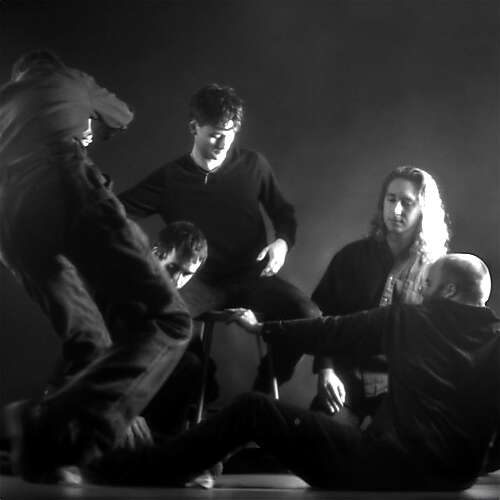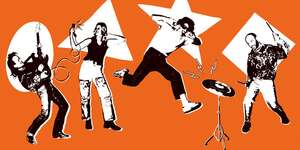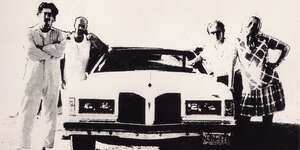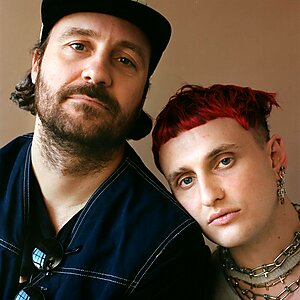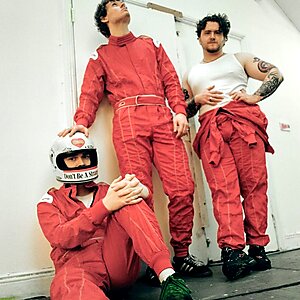Font
Font
country: USA
genre: Rock
styles: Post-Punk, New Wave, Dance-Punk, Art-Punk

Hey Kekulé
 Single
Single
Spotify Bandcamp Soundcloud
Reviews and Comments
Austin quintet Font — Thom Waddill (guitar/synth/vocals), Jack Owens (drums), Anthony Laurence (guitar/synth/sampler), Logan Wagner (percussion/sampler), and Roman Parnell (bass/synth) — announce their debut album, Strange Burden, to be released July 12th via Acrophase Records, and present its blistering and irresistibly dancy lead single 'Hey Kekulé.' Strange Burden shows Font both translating the intensity of their live shows into the studio and polishing the surfaces of their music to juxtapose and dislocate genres with a quick-footed, nearly pop-art sensibility. Leading up to the album’s release, Font will support Yard Act throughout the west coast (all dates are below).
Font create driving music of sampled stabs, dance beats, and euphoric choruses. As drummers Owens and Wagner lock into a co-constructed groove, Parnell’s bass bridges the kinetic back line to multi-instrumentalist and environment-shaper Laurence. From this density emerge frontman Waddill’s associative lyrics and electric-shock dance. They chose their name because it’s the archaic word for “fountain”; it implies both an abundance and the receptacle that holds it. To watch the band is to experience a tension of excess and containment as each member pulls the music into something that transcends its starting terms.
In creating Strange Burden, the band referred increasingly to Talking Heads’ writing process with Brian Eno for Remain in Light, where the rhythm section would lay down grooves and loops for Eno and Byrne to later structure and write over. The first real flash of success with this process came with 'Hey Kekulé,' the blistering and irresistibly dancy lead single for Strange Burden, which was a big step forward for the band and how it could live and grow together as an organism.
Waddill’s lyrics draw from dreams, automatic writing, mythology, and childhood. He begins with rhythm and emotion and sound rather than subject. He loops the music, hits record, dances around and sings nonsense until a vocal part sticks. Then, he fills in the syllables as quickly as he can with culled lines from nonsense poems, scribbled phrases, and whatever occurs to him in the moment of movement and singing. Sometimes there’s a frame story or scenario, as with “Hey Kekulé,” but for other songs, the lyrics are meant to serve only a sonic function.
Inspired by the Cormac McCarthy essay The Kekulé Problem about a German chemist, 'Hey Kekulé' is the most referential and direct song about what Waddill is interested in as a lyricist and performer. But Waddill is quick to clarify: “As with the other songs on the record, there is no intentional meaning to the symbols, references, phrases, and images I use. I’m not trying to ‘say’ anything about the subconscious – I’m only trying to channel it. And a big reason why I could do that here was because it was one of the first songs where the 5-part machine of the band really began to whir – I had a hand in almost none of the music for the song. The beat, the piano part, all of it came from the band, and because it was a truly foreign container, I could simply release and respond.”
The song’s music video, co-directed by Font and Blake Nelson, shows Waddill twitching and gesticulating on a platform with a rotating light casting his moving shadow against the wall. References are as disparate as Radiohead’s video for 'Lotus Flower,' video artist Joan Jonas, the Austin-based experimental dance legend Deborah Hay, and Swiss psychiatrist Carl Jung.
Font officially released only one song, the razor-sharp 'Sentence I,' over the course of the first two years of their existence. Their second single, 'It,' released last fall, tabled the guitars and shouting chants of that first single for heavy synths, dance beats, and samples. The mystery surrounding them seemed only to increase their allure. They built a reputation on the pure creativity and force of their live performances, and they rode this excitement to shows across the U.S., sharing bills with bar italia, Water >From Your Eyes, Horsegirl, and CHAI and landing a slot on the main stage at Austin City Limits.
Patchworked over years of improvising, playing, recording and re-recording both in studios and at home, Strange Burden is the fever-dream document of Font’s nascent stage. It careens from precipice to precipice, revelation to revelation; over the course of a lean 28 minutes, the record covers a dizzying amount of ground. It draws from the past – New Wave, No Wave, rock, punk, pop – but rejects nostalgia, relentlessly pushing their influences into the future.
“Release and respond”: this a central ethos for the band, an injunction for both themselves as musicians and for the listener. This, for Font, is a form of radical vulnerability. Font’s music is at once a rejection of irony and of self-mythologizing confessionalism; it remains doggedly sincere even in its opacity and eccentricity. For Strange Burden, both the process and the product embrace mystery and risk to intense and exalted effect.
latest releases



